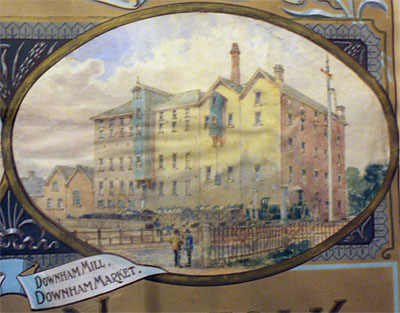 |
|
c.1890
|
|
Downham Market
Steam Mill |
 |
|
c.1890
|
|
Downham Market Steam Mill named Eagle Roller Mills, was often known as Bird's Mill as along with Kings Lynn Boal Mill, it was once owned by the Bird family. The mill stood beside the railway with a level crossing on the road beside the mill. The mill was later renamed as Heygate's Mill. |
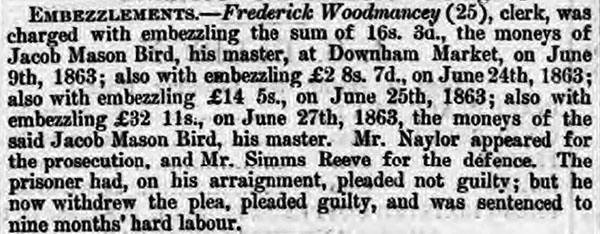 |
1863 |
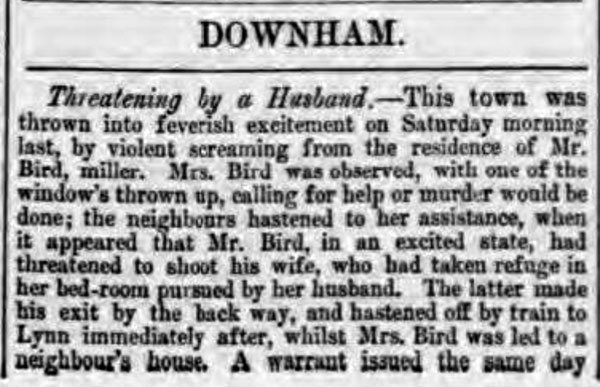 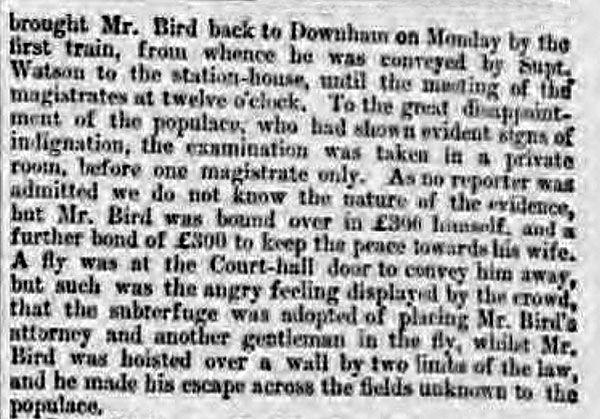 |
1865 |
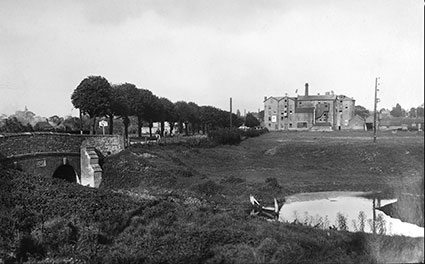 |
c.1905 |
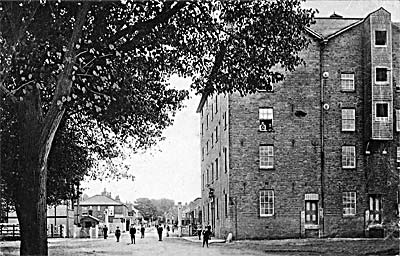 |
c.1906 |
Jacob Bird was born in 1789 and ran Fincham_postmill for at least 20 years. His son, Jacob Mason Bird, was running Hilborough_watermill in the 1840s and in 1848, along with also Northwold Manby's_Turret_postmill,he in turn had a son, Frederick Augustus Bird, who went on to run what became known as Bird's mill at Downham Market. |
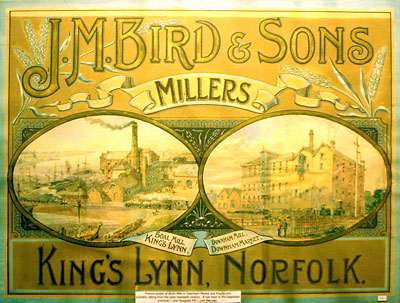 |
|
An advertising plaque c.1890
|
My name is Peter Bird and I am the son of the late Algy Bird who was the
last of the Birds to mill flour in Norfolk. I have been endebted to your
website for some early history of my forbears and where they lived, and I
would like to express my gratitude for the efforts you have made. |
I have just been browsing through the internet of pictures of Downham Market. I was most interested to see pictures of Downham Mills. Especially so as my husband and I both worked there in the Office from 1957- 1962. We cannot remember the exact time of Peter Bird's father leaving work but we do remember that his brother Aubrey Bird moved to Wereham and took over running the Mill with the support of Frederick Mardell the General Manager and Paddy ???? Mill Manager. In about 1960 Aubrey sold the Mill to Heygates of Bugbrooke. Northampton, but he remained involved with the daily Management. |
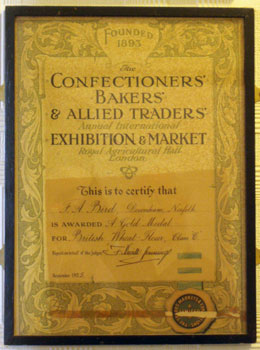 |
|
Certificate September 1925 |
Excerpt from |
The Birds had been millers in Norfolk for at least three generations and it was taken as read that Algy, born in 1896, would eventually take over the family concern which included the Downham Market steam mill founded by his grandfather, Jacob Mason Bird, in the 1840s. “I don’t think he would have had any choice in the matter,” says Peter Bird. “He was the eldest son and you did what you were told in those days.” Monday, September 3, 1917, dawned fine enough for 46 Squadron to make its first offensive patrol since returning to the front, the honour falling to A flight whose five Pups included Second Lieut Algernon Frederick Bird, late of the Norfolk Regiment. Some 10 years later, Algy Bird scribbled a candid account of the frantic fight that followed on the back of a 1927 calendar. Characteristically modest, it is the only known unofficial narrative he ever wrote of the day’s dramatic events. In it, he writes of climbing to 14,000ft before forging 10 miles into enemy territory. “Normally on these occasions,” he wrote, “we were treated to a liberal dose of Archie (anti-aircraft fire) but on the morning in question everything appeared more than usually calm - an ominous calm as it proved.” From memory, he thought they had covered their patrol area once and had turned to repeat the exercise when an enemy aircraft was spotted some way below. It was some time around 7.15am and the flight commander signalled his intention to attack. Algy followed and, on sighting another enemy machine, made a line straight for it. So far so good, but things soon went awry as more German fighters joined the “scrap”. In no time, the five Pups were heavily outnumbered and fighting for their lives. And an already dire situation was rapidly compounded by a case of mistaken identity that almost proved fatal for the 21-year-old Norfolk aviator. “While chasing my particular opponent,” recorded Algy, “I took a glance over my shoulder to find myself being followed by two triplanes which I at once took to belong to an RNAS (Royal Naval Air Service) squadron with whom we occasionally co-operated. “The next thing that I knew was that I was under a fusillade from machine guns at very close quarters, my engine cut out and I got one under my right arm which momentarily knocked me out.” Unbeknown to Algy, the pilot of one of the ‘tripes’ weaving in and out of his slipstream was von Richthofen himself and, like his intended victim, he was just feeling his way back into action following his own brush with disaster. “It was impossible to fly straight for more than a few moments at a time before they got their guns on me and my progress towards our lines was very slow compared with the height I was losing for my engine was a passenger only…” Such was Algy’s handling of his mortally damaged aircraft that Richthofen was under the mistaken impression that the Pup was being flown not by a novice but an experienced opponent, and it has been suggested that it was out of respect for his adversary’s courageous struggle that he uncharacteristically abstained from delivering the coup de grace. though the encounter did have a final surprising twist. For having survived narrowly being lynched by German troops, Algy, his minor wound having dressed, found himself being greeted and filmed with Richthofen and the aircraft designer Anthony Fokker who happened to be visiting the front. Stills from the film show conqueror and victim both smiling, though probably with rather different thoughts in their minds. “Who could blame him?” says Algy’s son. “He was still alive, which was remarkable in itself.” Indeed it was. Out of the more than 80 airmen whose aircraft fell victim to the Red Baron’s guns only 29 lived to tell the tale. And there was, of course, one final irony attached to the unequal combat between plucky rookie and the war’s top gun: whereas Algy Bird, having survived the war as a prisoner, went on to live another 40 years, most of it spent running the family business in Downham, Manfred von Richthofen had less than eight months to live. Such mischance served only to underline Algy Bird’s extraordinary good fortune that 90 years on seems fully deserving of that annual celebratory glass of champagne to mark the anniversary of his famous joust with the Red Baron. |
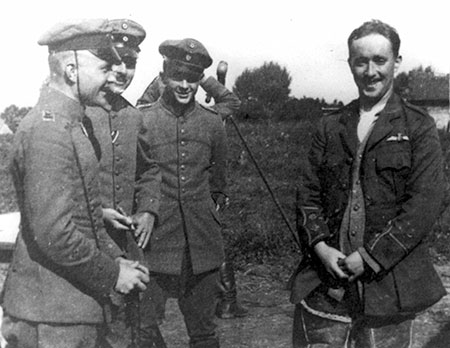 |
|
Baron Manfred von Richthofen (left foreground) and Algy Bird (right) after his capture Monday 3rd September 1917 |
Was most interested to see the article yesterday regarding Algy Bird. I began working in the office in 1942 and remember Mr Bird and Mr. Mardell the Secretary very well. I think it was in 1943 that the Steam engine suffered a broken crankshaft and sadly as it was a German Lanz machine a replacement could not be found. A decision was then made to change over to electricity for power and the old steam engine was removed and after many months of having to buy-in flour from neighbouring millers production was resumed. After electricity was installed the first task for me each morning was to go into the meter house and read the meters and this was checked against production each day.The water meter also had to be checked as the mill was now using mains water and not from the reservoir near the small river which was where the relief channel is now.The water for the steam engine had been drawn directly from this source. I left the mill in 1945 to join the RAF I am not sure when Mr. Bird died but his brother Aubrey who had an engineering works in Grantham came and ran the business for some time and the business was eventually sold to Heygates. |
I am now in a position to add a little to the narrative that you have
already included on your website. Jacob Bird (Snr) was born in Sculthorpe,
near Fakenham. He is mentioned in the Will of John Bird, a farmer of that
parish, of which I have a copy. It would appear that Jacob was illegitimate
and claimed by John Bird as his son for appearances sake as, by 1789, he
was, by his own admission an old man. It is possible that Jacob was the
illegitimate son of one of John Bird's real sons, Isaac, in true biblical
fashion. Jacob's eldest brother was a butcher in Burnham Market, and his
second oldest brother was a cabinet maker in King's Lynn. |
You might be aware that Bird's Mill in Downham Market is called the "Eagle
Roller Mills". If anyone can enlighten me as to the significance of the
eagle in milling I would be grateful. Clearly my great-grandfather, Jacob
Mason Bird had a thing about eagles. Residents of Downham Market will know
that the Conservative Club is at Eagle House, Bridge Street. This was the
residence of Jacob Mason Bird when he moved from Hillingdon and where he
died in 1894. Old flour bags from Bird's mill had an emblem of an eagle
grasping a dolphin and the legend "Aquila non captat muscas" (eagles don't
stoop to catch flies). |
The will of Mr. Jacob Mason Bird, of Downham Market, Norfolk, miller, who died on April 25th has been proved, the value of the personal estate amounting to upwards of £21,000. |
You may be interested in an advert I found in The Norwich Mercury dated 12 Aug 1848 referring to the Northwold_Post_Mill; at least it establishes that Jacob Mason Bird operated the Mill in 1848. |
Ref. the row that Jacob Mason Bird had with his wife Mary in 1865 . . .. |
Heygates Mill used to be known as Bird's Mill as it was owned by the Bird family. An eagle, which was used to represent the Bird name, can be found over the main door of the mill and an eagle can also be found on the Conservative Club on Bridge Street, where Mr. Bird lived. The mill was originally steam driven and converted to electricity in 1943. |
I have always speculated that the money to build the mill at Downham would have been beyond the means of a tenant miller and that the investors were the people who funded the construction of the railway from Ely to King’s Lynn in 1845. It would very much have been in their interests. I think that the investment vehicle was F. A. Bird (Downham Mills) which I think was founded in 1846, before the mill was built. Peter Bird - 17th April 2023 |
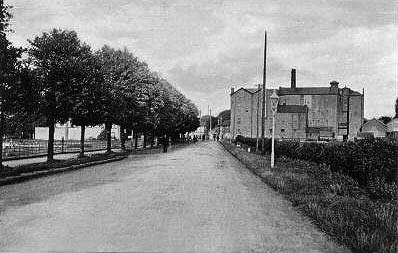 |
c.1910 |
1851: Mill built |
If you have any memories, anecdotes or photos please let us know and we may be able to use them to update the site. By all means telephone 07836 675369 or
|
Copyright © Jonathan Neville 2002 |